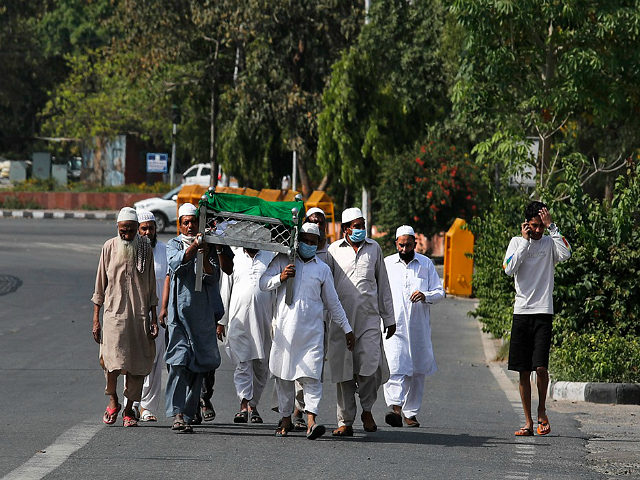India’s coronavirus caseload hit a three-month high on Wednesday, prompting Indian Prime Minister Narendra Modi to urge state leaders to act quickly and decisively to counteract the new infection surge.
India’s health ministry recorded 28,903 new coronavirus cases on March 17, the country’s highest single-day increase since December 13. Single-day deaths from the virus also spiked on Wednesday to 188, the highest number recorded in two months.
“The number of [coronavirus] cases is increasing in some states. This increase is more than 150 percent in 70 districts of the country. We must stop this emerging ‘second peak’ of corona[virus] immediately,” Prime Minister Modi told Indian state leaders on March 17 during a virtual conference.
“The position we have reached in the fight against corona[virus], the confidence we have now, should not give way to carelessness,” he added, referring to a recent drop in the number of active coronavirus cases across much of India.
“We need to take quick, decisive steps,” Modi instructed the state governors, adding that some of these measures should include the enforcement of mask-wearing mandates and increased coronavirus testing.
Nearly 62 percent of India’s new coronavirus cases on Wednesday were documented in the western state of Maharashtra, which is home to the Indian commercial capital of Mumbai. In response to its surging coronavirus caseload, Maharashtra has ordered some of its districts to observe lockdown measures. Cinemas, hotels, and restaurants in these districts must limit operational hours and capacities until the end of March.
“As cases are going up in Bengaluru, Kalaburagi, and Bidar which are located [in India’s southern Karnataka state] at the border of Maharashtra, Prime Minister Narendra Modi asked us to focus on these three districts,” Karnataka state Chief Minister B.S. Yediyurappa told reporters after participating in the video conference with Modi on March 17, according to the Press Trust of India (PTI).
Modi also encouraged Indian states on Wednesday to work proactively to ensure coronavirus infections do not increase in the countryside, where rural healthcare facilities are sparse and ill-equipped to handle a potential surge in patient numbers.
“Rural India is home to two-thirds of the country’s 1.35 billion people,” according to Reuters. The Indian federal government has blamed “crowding and a reluctance to wear masks” amongst the country’s population, the second-largest in the world after China, for the recent spike in new coronavirus cases, according to the news agency.
Hundreds of thousands of Hindu pilgrims ignored social distancing and mask-wearing mandates at the Kumbh Mela Hindu festival on March 11 in Haridwar, a city in northern India’s Uttarakhand state, to gather on the banks of the Ganges River and bathe in its waters as part of the ritual. The seven-week-long festival, which launched in January, is expected to draw several million pilgrims to Haridwar by its conclusion in April.

COMMENTS
Please let us know if you're having issues with commenting.